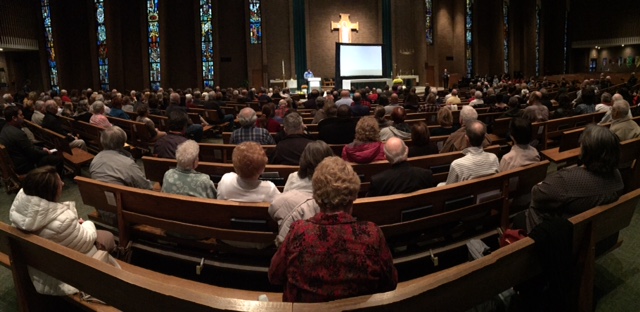
PASTORAL PLAN UPDATE: 'WELCOMING AND BELONGING' PARISH PROJECT INTRODUCED
Anne-Marie Welsh
10/29/2018

parish project at the first of three vicariate meetings.
A year after the preliminary recommendations of the Faith Formation Task Force were shared at meetings across the diocese, Bishop Lawrence Persico and members of the Faith Formation Implementation Team presented four key areas of encounter parishes will be asked to explore, one at a time, over the next four years. They are: Welcoming and belonging, catechesis, sacramental preparation and service.
“These areas are not new,” Michele Smith, religious education administrator at St. Callistus Parish, Kane, said during her remarks. “But there is always room to improve and refine.”
The presentations, held in Erie, St. Marys and Hermitage on three different nights the week of Oct. 22, opened with remarks from Bishop Persico, who called faith formation “the most important aspect of pastoral planning for our diocese.” But before bringing others to the podium, he opened the floor to questions about the Grand Jury Report.
“I think you’ll agree, we need to spend a little time together talking about the fact that we’ve been at ground zero in the church’s sexual abuse crisis,” he said. “It will not be productive to focus on faith formation if there are significant, unresolved issues in the air.”
The bishop then reviewed the actions he has taken since he received the subpoena from the grand jury, including a significant revision of the diocesan Policy for the Protection of Children, responding to media, communicating with pastors and parishioners, meeting with victims, creating opportunities for prayer, and developing a pastoral response team to help parish and school communities that are asking for help processing some of the emotions they are experiencing.
Questions ranged from how parishes might reach out to those who have felt so betrayed that they no longer attend Mass, to why the diocese is supporting a compensation fund for victims rather than the lifting of the statute of limitations.
After the Q & A, members of the Faith Formation Implementation Team laid the groundwork for what it expects will be at least the next four years.
Deacon Marty Eisert, pastoral planning chair, focused on intentional discipleship.
“This faith formation initiative calls for a fundamental change in how we are formed in our Catholic faith, and especially in how we live that faith,” he said. “The change must take root in our hearts, where the essence of who we are resides. Becoming intentional disciples filled with zeal for the Lord and the Gospel message is a lifelong commitment to knowing, understanding and living our faith.”
Michele Smith then did a brief review of the six recommendations of the Faith Formation Task Force first introduced in 2017. (The full list of recommendations can be found at www.ErieRCD.org/bishop/planning.html.) Noting that they are rooted in documents from both Vatican II and the United States Conference of Catholic Bishops, she reminded those present that they are a foundation, a means to an end that need to be kept in mind “as we take steps to infuse our parishes with new life, with vibrancy and with possibilities.”
As noted above, Smith said each of four key areas will be explored, one at a time, over the next four years. Throughout 2019, parishes will be invited to consider what it means to welcome and what it means to belong.
The evening concluded with remarks from Deacon Steve Washek, the newly appointed executive director of faith formation for the Diocese of Erie. His personal remarks included the story of his own conversion, which occurred through a process of invitation, encounter, engagement, relationship and belonging, beginning when he was a student at Gannon University.
Acknowledging that trust has been broken with the church, Deacon Washek said people might wonder why the diocese is focusing on welcoming and belonging.
“In fact, this initiative is the very thing we need,” he said, “to rebuild relationships — the foundation to belonging.”
After discussing the difference between the two aspects, each parish was given a project to complete by early December: identifying a concrete example they are either doing or would like to be doing to enhance their commitment to welcoming, and the same for belonging. Beginning in January, Deacon Washek will organize a series of regional meetings during which parish representatives will come together to brainstorm and share ideas around the topics.
“It was a great meeting, everybody was energized,” said Father John Miller, pastor of St. Stephen and St. Joseph parishes in Oil City. “It was helpful to hear Bishop Persico tell us the church is not stopping because of the Grand Jury Report. We need to keep evangelizing. That really rang true for people.”
-
